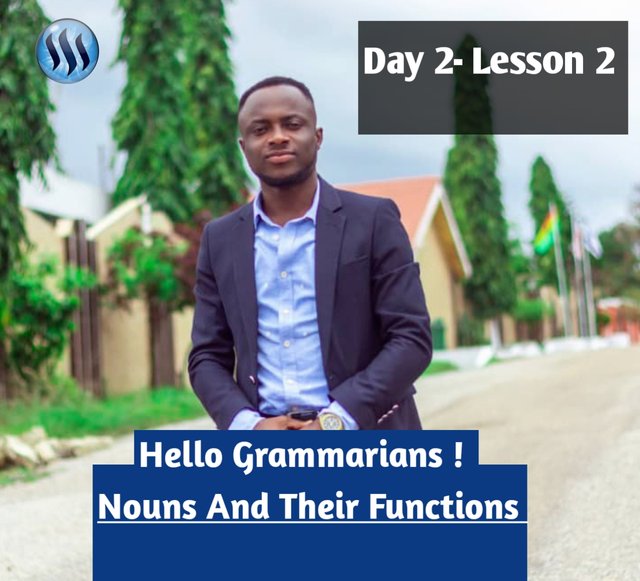
It is another lesson day and I hope you all are ready for this new lesson. In our other lesson, we ended on Parts Of Speech. We are to continue with Nouns in this lesson. We got to know that there are 8 word classes and these word Classes are identified in sentences not in isolation.
By the end of today's lesson, the student will be able to:
Identify nouns in sentences.
Distinguish between a noun and other word Classes
identity two functions of nouns in sentences.
Use them appropriately in speech and in writing.
A noun makes reference to a person, a place an animal or a thing. Examples; boy, girl, paper, pen. A noun may be nominal which means that typically the words that function as nouns are not typically nouns.
Note: Identify words according to their roles in a sentences and not how they appear.
- Subject
- Object(direct or indirect)
- Complement
- Appositive
- Object Of the preposition
A noun functions as a subject when it answers the "who/what"question before the verb.
Paul is kind.
Who is kind?
Paul. Paul therefore becomes the subject is the verb is
The subject is what the predicate talks about. After the subject is taking out, the other parts become the predicate. The predicate is introduced by the predicator which is the verb.
The beautiful girl is rude.
Who is rude?
The beautiful girl.
It therefore becomes the subject of the verb "is"
A noun functions as an object.
We have an object when the verb is a transitive verb. Without a transitive verb, we can never have an object. In order to have an object, we have to ask ourselves the who/what question after the verb is introduced.
Example: Paul kisses the woman.
Paul kisses who?
The woman. It therefore becomes the object of the verb kisses. Remember that the verb kisses is a transitive verb.
A noun functions as a complement. A noun functions as a complement when the verb we have is a copular, linking verb example: is, am, are,was, tastes, becomes, looks, feels. In complements, the verb links the subject to what it complements.
For example: He tastes the food.
Here, the food is the complement of the verb "tastes". It is a complement because the verb tastes links the food to he.
A noun functions as an object of the preposition. In this, the preposition comes before the noun. For example:
The book is on the table
The table is an object of the preposition on.
Functions as an appositive.
A noun functioning as an appositive explains a noun further. It doesn't describe. Without the appositive, the sentence is meaningful but the duty of appositives are to explain nouns further.
For example:
Kofi Anan,the UN Secretary General, is dead.
Here the UN Secretary General is the Appositive to the noun Kofi Anan. Appositives are marked of by commas.
I hope you love today's lesson. Time you for your time
Thank you, friend!


I'm @steem.history, who is steem witness.
Thank you for witnessvoting for me.
please click it!
(Go to https://steemit.com/~witnesses and type fbslo at the bottom of the page)
The weight is reduced because of the lack of Voting Power. If you vote for me as a witness, you can get my little vote.
Downvoting a post can decrease pending rewards and make it less visible. Common reasons:
Submit
TEAM 5 CURATORS
This post has been upvoted through steemcurator08. We support quality posts anywhere and with any tags.
Curated by: @pelon53
Downvoting a post can decrease pending rewards and make it less visible. Common reasons:
Submit
This is lovely, I strongly believe your students enjoy each and every class of yours to the maximum. You are a great teacher and thanks for educating us.
Greetings.
Downvoting a post can decrease pending rewards and make it less visible. Common reasons:
Submit
Welcome
Downvoting a post can decrease pending rewards and make it less visible. Common reasons:
Submit